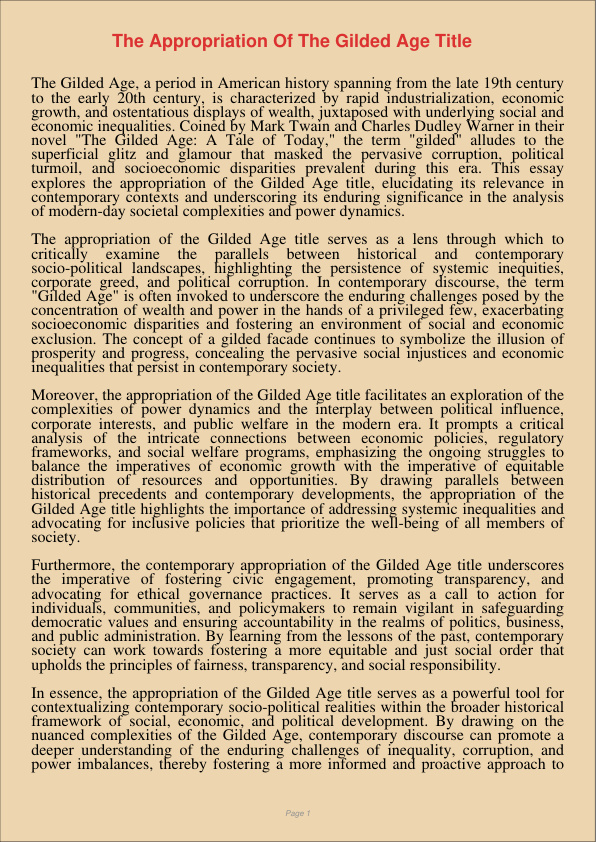The Appropriation Of The Gilded Age Title
Jan 12, 2024
gilded age title
appropriation
Religion and Theology
Engineering and Construction

The Gilded Age, a period in American history spanning from the late 19th century to the early 20th century, is characterized by rapid industrialization, economic growth, and ostentatious displays of wealth, juxtaposed with underlying social and economic inequalities. Coined by Mark Twain and Charles Dudley Warner in their novel “The Gilded Age: A Tale of Today,” the term “gilded” alludes to the superficial glitz and glamour that masked the pervasive corruption, political turmoil, and socioeconomic disparities prevalent during this era. This essay explores the appropriation of the Gilded Age title, elucidating its relevance in contemporary contexts and underscoring its enduring significance in the analysis of modern-day societal complexities and power dynamics.
The appropriation of the Gilded Age title serves as a lens through which to critically examine the parallels between historical and contemporary socio-political landscapes, highlighting the persistence of systemic inequities, corporate greed, and political corruption. In contemporary discourse, the term “Gilded Age” is often invoked to underscore the enduring challenges posed by the concentration of wealth and power in the hands of a privileged few, exacerbating socioeconomic disparities and fostering an environment of social and economic exclusion. The concept of a gilded facade continues to symbolize the illusion of prosperity and progress, concealing the pervasive social injustices and economic inequalities that persist in contemporary society.
Moreover, the appropriation of the Gilded Age title facilitates an exploration of the complexities of power dynamics and the interplay between political influence, corporate interests, and public welfare in the modern era. It prompts a critical analysis of the intricate connections between economic policies, regulatory frameworks, and social welfare programs, emphasizing the ongoing struggles to balance the imperatives of economic growth with the imperative of equitable distribution of resources and opportunities. By drawing parallels between historical precedents and contemporary developments, the appropriation of the Gilded Age title highlights the importance of addressing systemic inequalities and advocating for inclusive policies that prioritize the well-being of all members of society.
Furthermore, the contemporary appropriation of the Gilded Age title underscores the imperative of fostering civic engagement, promoting transparency, and advocating for ethical governance practices. It serves as a call to action for individuals, communities, and policymakers to remain vigilant in safeguarding democratic values and ensuring accountability in the realms of politics, business, and public administration. By learning from the lessons of the past, contemporary society can work towards fostering a more equitable and just social order that upholds the principles of fairness, transparency, and social responsibility.
In essence, the appropriation of the Gilded Age title serves as a powerful tool for contextualizing contemporary socio-political realities within the broader historical framework of social, economic, and political development. By drawing on the nuanced complexities of the Gilded Age, contemporary discourse can promote a deeper understanding of the enduring challenges of inequality, corruption, and power imbalances, thereby fostering a more informed and proactive approach to addressing contemporary societal issues and fostering a more equitable and just society for all.